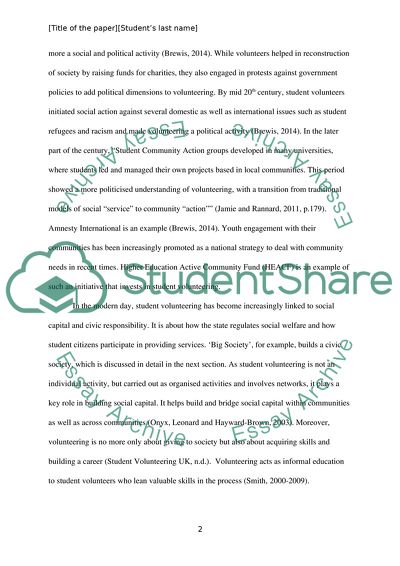Cite this document
(Development of Student Volunteering Essay Example | Topics and Well Written Essays - 2250 words, n.d.)
Development of Student Volunteering Essay Example | Topics and Well Written Essays - 2250 words. https://studentshare.org/education/1861795-discuss-the-nature-of-volunteering-including-theoretical-perspectives-your-report-will-discuss-your-understanding-of-volunteering-voluntary-action-within-a-political-and-socio-economic-context
Development of Student Volunteering Essay Example | Topics and Well Written Essays - 2250 words. https://studentshare.org/education/1861795-discuss-the-nature-of-volunteering-including-theoretical-perspectives-your-report-will-discuss-your-understanding-of-volunteering-voluntary-action-within-a-political-and-socio-economic-context
(Development of Student Volunteering Essay Example | Topics and Well Written Essays - 2250 Words)
Development of Student Volunteering Essay Example | Topics and Well Written Essays - 2250 Words. https://studentshare.org/education/1861795-discuss-the-nature-of-volunteering-including-theoretical-perspectives-your-report-will-discuss-your-understanding-of-volunteering-voluntary-action-within-a-political-and-socio-economic-context.
Development of Student Volunteering Essay Example | Topics and Well Written Essays - 2250 Words. https://studentshare.org/education/1861795-discuss-the-nature-of-volunteering-including-theoretical-perspectives-your-report-will-discuss-your-understanding-of-volunteering-voluntary-action-within-a-political-and-socio-economic-context.
“Development of Student Volunteering Essay Example | Topics and Well Written Essays - 2250 Words”. https://studentshare.org/education/1861795-discuss-the-nature-of-volunteering-including-theoretical-perspectives-your-report-will-discuss-your-understanding-of-volunteering-voluntary-action-within-a-political-and-socio-economic-context.


